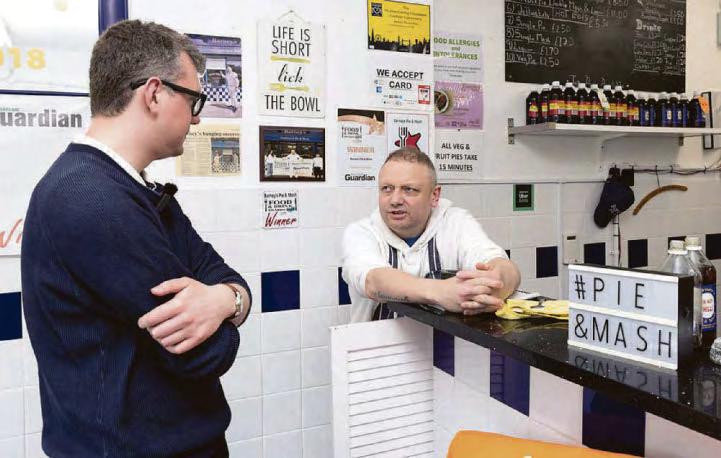Just days before the arrival of "awful.
April" with essential household bills due to rise - Piter Hak, 62, and his son Alfie, 27, are putting the lids on rows upon rows of mincefilled pastry parcels ready for baking in the 64-year-old oven.
It's a sight replayed countless times over the decades, all over London, but potentially not for much longer.
The Pie and Mash Club, a society of gastronomes who rate London's traditional dish, has estimated that there are fewer than 40 venues in London and 76 nationwide.
Many have closed or moved further afield to Essex and Kent, as Cockneys flee the capital and business owners seek cheaper bills.
By contrast, estimates suggest around 300 pie and mash shops operated in the capital in the mid-19th century, providing a cheap, filling meal to workers.
Piter calls gas and electric bills the "real killer" for shops and he has been forced to raise prices as a result. "Customers say, 'It's a lot of money. It's gone up.' But we only put it up once a year to try to cover costs.
image [https://cdn.magzter.com/1583504377/1743552593/articles/Wp0CRGM8ZMwiQ6rkJKsys/1334345444.jpg]
"The problem is, if you put 20p on a £4 meal, people notice because they come here for a cheap meal. Bigger restaurants can swallow these costs - we can't." Noted Eel and Pie House's economic hardships are due to worsen as it prepares for huge increases in energy, water and council tax bills this month, aside from the £2,000 they already pay annually for their staff parking permits.
Small businesses are also braced for a hike in national insurance, which is rising from 13.8% to 15% on workers' earnings. To make matters worse, the threshold at which employers begin paying NI has also fallen from an annual salary of £9,100 to £5,000.
Piter calls the NI rise the "worst thing" his business faces right now. "A lot of my staff have kids and work part time. The problem is they're now going to be penalised by the tax man." As for the ongoing cost-of-living crisis, Piter is pragmatic about its impact on his industry. "There always used to be a saying in the pie and mash game: 'Pie and mash is great when there's a recession.' I don't believe the same is true now." Pie and mash emerged as a working-class staple in the East End during the Victorian era as workers and communities sought affordable, nourishing meals.
Henry Blanchard opened the first establishment in Union Street, now part of London Bridge, in 1844.
Eels, rich in nutrients and readily available from the Thames Estuary, provided the original filling but as they declined in number over time, mutton, beef and kidney became equally popular.
image [https://cdn.magzter.com/1583504377/1743552593/articles/Wp0CRGM8ZMwiQ6rkJKsys/3337143937.jpg]
TODAY, the remaining shops are contending with changing food tastes and soaring costs.
One of London's oldest pie and mash shops served its last customers on Saturday after 116 years. Harrington's in Tooting has always been run by the same family, but owner Bev Harrington, 54, who started working in the shop aged 12, says she can no longer afford to keep going. "Years ago you'd get your regular customers and it's just not like that any more, you don't get those regulars.
"Tooting has changed dramatically over the years and it's nothing like it used to be, it's dirty and there's rubbish everywhere," she says.
Bev's energy bills have risen by hundreds of pounds since lockdown and dealing with this has "crucified" her mental health. But as for reduced custom, she cites both the negative impact of parking restrictions and London Mayor Sadiq Khan's charge on vehicles that are not eco-friendly enough. "We've probably lost older customers because they've passed away but also they can't afford to replace their car because it's not ULEZ compliant," she says.
Three generations of one family gather in the shop to order pies for the last time. The Cody clan range from 11-month-old Reuben to grandad William, who says: "Reuben is the sixth generation to eat here my great-nan used to come here first."
Some customers feel that Tooting had changed and the core of working-class London had been hollowed out.
David Tanner, a retired oil and gas engineer, said: "The community around here isn't probably as English now, I don't imagine they would eat this."
When the 70-year-long patron of Harrington's was younger, pie and mash was "a staple diet" and "a cheap and filling meal".
Back at Noted, Piter is quick to state the changing customer demographic doesn't necessarily mean the end of his trade. "I don't look back with rose-tinted glasses. Things have changed, times have changed.
"I remember back in the Seventies my dad saying to me, 'Oh, it's all changing,' harking back to what it was like during the war. I used to respond, 'Well, everything's got to change.' And now I'm realising that myself.
"My son's changing everything. He's slowly bringing things to the 21st century, which I probably couldn't have done.
"We get a lot of Eastern Europeans, we get a lot of foreign people coming in and trying it and they often come back. It's never going to be a spicy, in-your-face meal like a curry or a kebab. It's a fairly plain meal."
But he concedes there are knock-on effects from ot...


